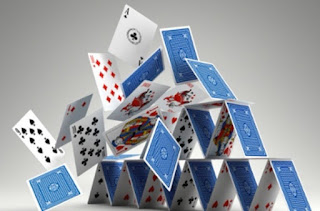I ended the last blog entry by mentioning how a refusal to take communion in the hand during the pandemic could be an indication of a much bigger problem facing the Catholic Church. We are a divided faith.
So you have two Catholics who both attend Mass every week. Both are in agreement on the Church's major hot button issues like abortion, pre-marital sex and gay marriage. Both have noticed the Church's decline over the years with low Mass attendance and the graying out of parishes. So you'd think these two people would naturally find a sense of kinship, right? Wrong.
Instead, very big disagreements erupt about the smallest of things and nowhere is this more prevalent than on the variety of Catholic blogs, websites and online forums. For all the theories on where the Church went wrong, a good number of traditionalists place the blame squarely on Vatican II. In their minds, the Church was once a very strong institution with no major problems whatsoever until 1965...
...the year the Church embraced liberalism, houses of worship were gutted, and the Mass lost its reverence causing attendance to sharply decline and making religion less important in people's lives. Some forum users espousing this claim tend to be older so they are obviously drawing on childhood memories to back up their opinions. But as the saying goes, correlation isn't necessarily causation and while some studies say Vatican II absolutely damaged the Church, other studies indicate a decline well before the early 1960s. Rising skepticism, materialism, the sexual revolution, television, and other factors have certainly taken their toll on Christianity in America. It's very convenient for traditionalists to blame just one thing instead of taking a comprehensive look at history and even if Vatican II never happened, it's likely the shocking discovery of the priest sex abuse scandal would have lead many to question the Church and their faith.
Younger Catholic keyboard warriors who never lived through the changes created by Vatican II use an array of articles, charts and graphs to form and defend their viewpoints but such information is rarely objective. I think what these young people are really looking for is a comforting spiritual home full of absolutes amid the secular relativism that's wreaked havoc among their peers.
Opinions on Vatican II's impact are all over the map with some saying its intentions might have been good but its implementation was a disaster. Whatever the case may be, we now have a community of online “trad” Catholics who regularly pick fights with anyone who might disagree with them. If you think you're 100% Catholic, they think they're 150% Catholic. Pope Francis is suspect, feminism made women too uppity and oh, and it's not the Church's job to help Catholic singles. One forum user I encountered was an older gentleman who lamented the day his parish introduced “hippie music” into the Mass. By that he meant singers who played guitars and tambourines. So where was it ever stated in the Bible that Jesus preferred the pipe organ?
In fact, one of my fondest memories from St. John the Evangelist in Beverly was when a father and his very attractive teen-aged daughter became cantors. He played an electric acoustic guitar and they both sang very passionately. I was an impressionable altar boy at that time and in addition to their beautiful music, I loved the daughter's two-handed handshakes during the sign of peace.
This forum user then went on to complain about all the choices Catholics had when it came to their faith. I challenged him by asking, “How sustainable would our religion be if it relied solely on rote learning and fear?” A nun with a ruler who routinely whacked her students probably drove more people away from the Church than a singer with a tambourine.
Then there's the Latin Mass. Some feel this is the only legitimate Catholic Mass and during online discussions the phrase novus ordo (new order) is tossed around like a derogatory term. One young trad posting to a forum expressed exasperation with his fellow novus ordo Catholics by saying, "If I had a dime every time someone said the Latin Mass was boring..." I remarked, "If I had a dime every time someone said the sky was blue..." My mother, who was born about 30 years before Vatican II is no fan of the Latin Mass because she felt it created a wall between the clergy and their flock. During the early 2000s, the pastor of my church was a young but traditional priest named Fr. David Barnes and he sometimes injected a little bit of Latin into the Mass. I didn't like it at all and was thankful to have grown up with Masses in the vernacular. Was I less Catholic for feeling that way?
Fr. Barnes was also a proponent of communion on the tongue, making the case that it should be the preferred way of receiving the Holy Eucharist. Other trads believe this too sometimes saying it's a form of submission that feels like you are being fed by the Lord. I contrast these opinions with that of Fr. Herbert Jones who was once pastor of the Carmelite Chapel at the Northshore Mall. During a sermon, the elderly priest told us he was resistant to communion on the hand at first but grew to love it because he felt closer to his parishioners. So we have two devout priests with two very different viewpoints. Which one is correct? Perhaps what's most important is that people are going to Mass in the first place...not out of fear or blind obedience but because they want to.

No comments:
Post a Comment